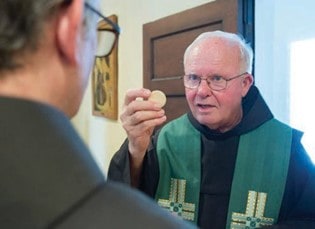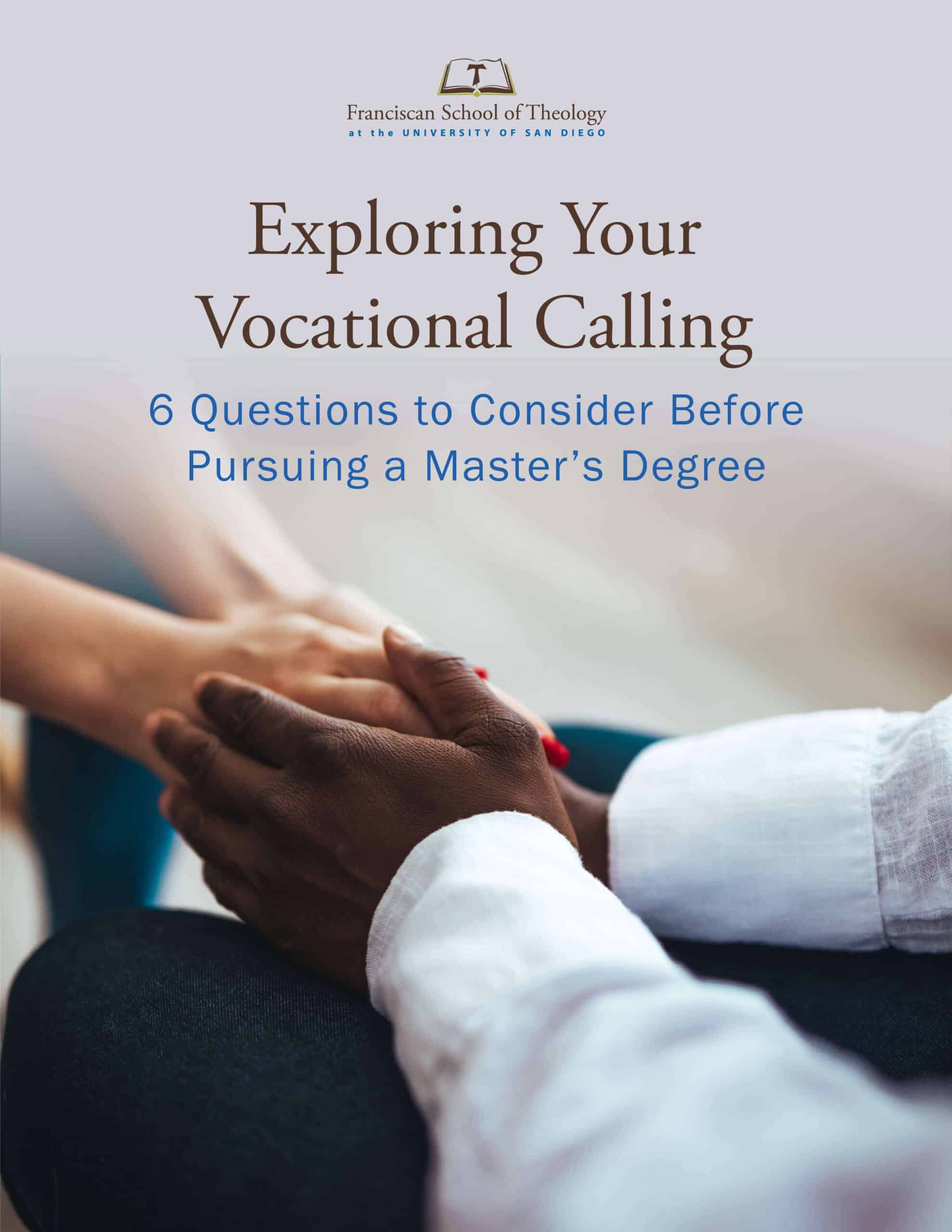Sharing Francis Widely

FST’s Digital Learning Program
BY PAT FANNING
Doors to the world are opening at the Franciscan School of Theology, on the campus of University of San Diego, Father Garrett Galvin, OFM, Ph.D., observes. Franciscan institutions—hospitals, colleges, parishes, and more—seek to maintain their Franciscan spirit. That requires learning Franciscanism. “Previously, you had to go someplace to undertake studies,” says Father Garrett. “Now we’re coming to you.”
Father Garret, president of the theology school, is speaking of a newly launched online, remote master’s degree program in theological studies. Begin- ning this past September, you can receive Franciscan academic training from anywhere. “It’s a high-quality product,” he says, beaming.
The Franciscan School of Theology (FST) has been on the campus of University of San Diego (USD) since 2019. University leaders approached FST with the idea of creating an online version of the graduate program in theological studies. FST and the university would share development costs and revenue generated. Initial funding was a major obstacle, eventually overcome by a major three-year pilot grant from the Province of Saint Barbara. The program will support itself through tuition.
“I was very skeptical.” Now, after developing the program over the past three years, he sees it positively, as “a completely different way of learning.” Online degrees such as the theological studies program have hatched a new way of thinking about university courses. Traditionally a professor would develop a course, get it approved by the academic dean, and then teach the course in a classroom. Now that professor is a subject matter expert, working with an instructional designer and an instructional technologist. The three work together closely (though maybe from afar) to create a course.
The Subject Matter Expert (SME=professor) might start by creating a PowerPoint,” a slide show, he explains. “Then you’ll email that PowerPoint to the instructional designer. They’ll put that PowerPoint into a more palatable form, which basically reflects the best practices for conveying information in the online environment.” Once the SME and the instructional designer agree that the right information will be presented correctly, the instructional designer works with an instructional technologist, checking in with the SME as they go. “A lot of times they’ll make it interactive,” says Father Garrett. “They’ll introduce elements that don’t allow the student to be passive. For example, you can’t just click through things. They’ll have a little exam in the middle to be sure you’re following it. The information technologist creates these elements to be sure the student is an active, rather than a passive, learner.” That’s getting into the weeds a bit, but you get the idea. The team translates the course material into a rich online experience that can be taken by a qualified student, anywhere.
“This oftentimes can be better than a traditional classroom experience,” says Father Garrett, speaking of learning styles. “If you’ve been in a traditional classroom, you know the extroverts will dominate it and the introverts don’t want to say anything to embarrass themselves.” That doesn’t happen online, especially when students take the courses apart from the other students whenever it works for them (“asynchronously”). “You also avoid the experience of students falling asleep in class,” he says—the bane of college professors.
Recorded lectures by FST faculty comprise part of the courses, along with assigned reading, writing assignments, and so on. A faculty member (professor/ SME) guides each group of students as they move through the material.

From any internet connection worldwide, students can take FST courses online to complete a graduate degree in theological studies.
Photo: Anete Lusina
Students and teachers everywhere There are currently about 55 students who attend the FST on campus, a number slightly impacted by the pandemic. That number will grow ideally to about 100, says Father Garrett. Students from the university (USD) can take classes in theological studies there too. Among the seven full-time and seven adjunct faculty are well-known Franciscan scholars, such as Michael Blastic, OFM; Joe Chinnici, OFM; and Darleen Pryds.
The online program offers courses by these same scholars as well as someday soon, faculty from afar. “Right now we start with our own professors. Each of us is designing and will teach his or her first course. Then we start talking to colleagues and peers, going to conventions, and coming up with lists of people who would like to be involved in this,” he explains.
Where’s the need for this? As we all struggle with the pandemic, the need for online learning is obvious, but this effort really isn’t pandemic-driven. The combination of offering on-site and online classes will truly increase the impact of the program. One of the greatest needs is right within the Franciscan family. “We have Franciscan institutions in most of the states. These universities need someone skilled in the charism to help the university stay close to its mission and ministries,” Father Garrett observes. ”I think their institutions can probably help pay for it because their institutions are going to benefit enormously. Franciscan hospitals, parishes, and social services will also benefit from a better understanding of our shared mission.”
All of this goes far beyond the online lectures that you might see on various topics, including Franciscan ones, he explains. This is a full course of study: twelve courses, each seven weeks long, completed over two years. The result is a master’s degree in theological studies. The FST is fully accredited to offer degrees in about 35 states. “I think we’ll probably get to 48 or 49,” he says. But that’s not all: “People can do this any- where in the world.”
Developing the program has been an iterative process, says Father Garrett, where you learn, improve, and learn again. He compares its root to the Latin iter, translated literally as “journey.” Developing this new digital way to study the charism of the Franciscan movement is certainly a journey, a work in progress. “You have to know your strengths and your weaknesses, and you have to be open to new things.” Sounds kind of Franciscan, now, doesn’t it? ❖

Renowned Franciscan scholar Joseph Chinnici, of St. Barbara Province, is one of the faculty members of FST who is developing and conducting online courses.
Photo: ©www.peterjordanphoto.com
Enrollment information here
Credit: The Way of St. Francis WINTER 2021· VOL.26, NO.3

